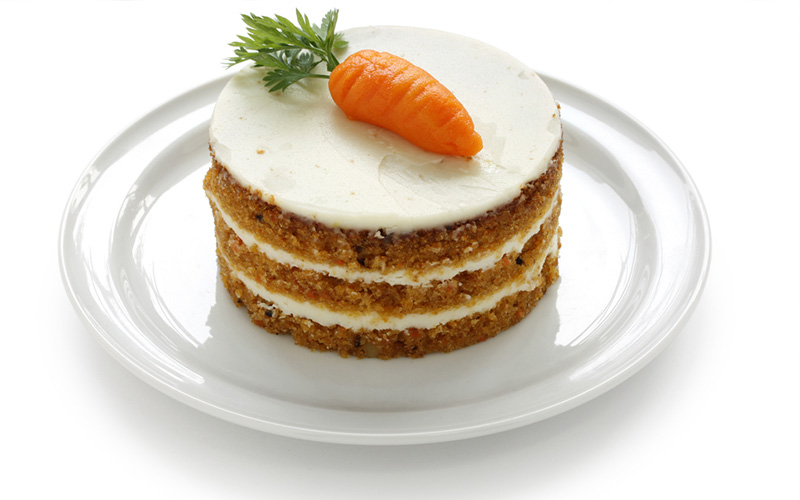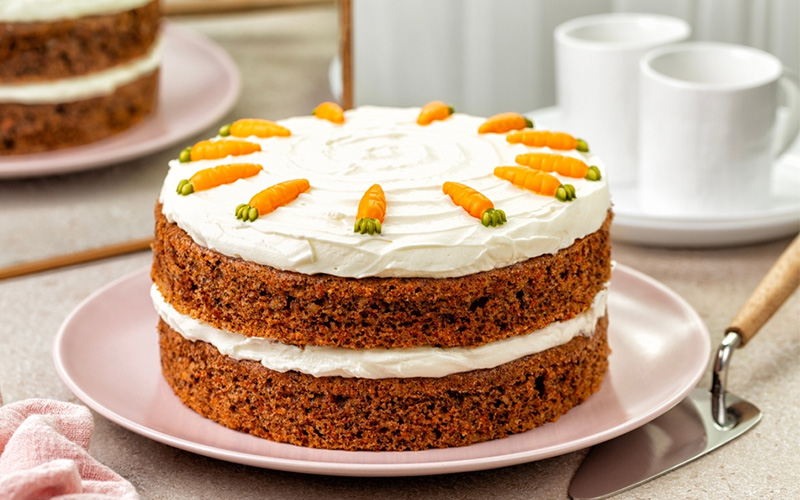
How Long Does Carrot Cake Last? Shelf Life And Storage Tips
Carrot cake is a delicious and popular dessert that combines the sweetness of cake with the earthy flavors of carrots. Whether you've made a homemade carrot cake or purchased one from a bakery, you may be wondering how long it will stay fresh and safe to eat. The shelf life of carrot cake depends on various factors, including its ingredients, storage conditions, and whether or not it contains perishable components like cream cheese frosting. In this comprehensive guide, we'll explore the longevity of carrot cake, how to store it properly, and some tips for extending its freshness.
How Long Does Carrot Cake Last?
The shelf life of carrot cake varies depending on several factors, including the cake's ingredients, how it's stored, and whether it contains perishable elements like cream cheese frosting. Here are some general guidelines for how long carrot cake can last under different circumstances:
Homemade Carrot Cake

Homemade carrot cake typically contains a combination of ingredients like carrots, sugar, flour, eggs, oil, spices, and sometimes nuts or raisins. If properly baked and stored, homemade carrot cake can last for the following durations:
- Room Temperature: Carrot cake, without any cream cheese frosting, can last at room temperature for about 2 to 3 days. Ensure it's stored in an airtight container or wrapped in plastic wrap to prevent it from drying out. However, the cake may lose some of its moisture and freshness over time.
- Refrigerator: If you have cream cheese frosting on your homemade carrot cake, it's best to refrigerate it. A carrot cake with cream cheese frosting can last in the refrigerator for 5 to 7 days. Make sure to keep it in an airtight container or cover it with plastic wrap to maintain its quality. The frosting can soften and become runny over time, so be prepared for that.
- Freezer: If you want to extend the shelf life of your homemade carrot cake, you can freeze it using Colored Square Aluminum Foil Dessert Pans. A properly wrapped carrot cake can stay in the freezer for up to 3 to 4 months. To freeze, cut the cake into slices or wrap the whole cake tightly in plastic wrap and then in the Colored Square Aluminum Foil Dessert Pans. Thaw it in the refrigerator when you're ready to enjoy it again.
Store-Bought Carrot Cake

Store-bought carrot cakes, such as those from bakeries or supermarkets, typically come with preservatives and are sealed in packaging designed to extend their shelf life. The shelf life of store-bought carrot cake is as follows:
- Room Temperature: Unopened, store-bought carrot cake can last for several days at room temperature. The packaging will have a "best by" or "use by" date that provides a general guideline for its freshness. It's best to consume the cake before this date to ensure optimal taste and quality.
- Refrigerator: If you've opened a store-bought carrot cake and have leftover slices, it's a good idea to refrigerate them. Carrot cake from a bakery or supermarket can last in the refrigerator for about 5 to 7 days if properly stored in an airtight container or resealable bag.
- Freezer: If you have a whole store-bought carrot cake or slices that you won't consume within a week, you can freeze them. Wrap the cake or slices in plastic wrap and then aluminum foil to prevent freezer burn. Store-bought carrot cake can stay in the freezer for 2 to 3 months or longer if properly frozen and sealed.
Factors Affecting The Shelf Life Of Carrot Cake
Several factors can influence how long carrot cake remains fresh and safe to eat. Here are some key factors to consider:
Ingredients
The ingredients used in carrot cake play a significant role in its shelf life. For example, cakes with cream cheese frosting or other perishable toppings may have a shorter shelf life than cakes without such toppings. Additionally, ingredients like nuts or raisins can affect moisture levels and freshness.
Moisture Content
The moisture content of the cake itself is crucial. A moist carrot cake is likely to stay fresh longer than a dry one. Factors like the recipe, baking time, and storage conditions can impact the cake's moisture.
Storage Conditions
Carrot cake's shelf life can only be increased with proper storage. To keep it from drying out and absorbing smells from the environment, store it in an airtight container, tightly wrap it in plastic wrap, or use resealable bags.
Temperature
Temperature is a critical factor. Carrot cake with cream cheese frosting should be stored in the refrigerator, while cakes without perishable toppings can be kept at room temperature for a shorter period. Freezing can significantly prolong the shelf life of carrot cake.
Air Exposure
The cake may become dried out and lose its freshness if it is exposed to air. To reduce air contact, make sure the cake is well covered. For further protection, you can also wrap individual slices in aluminum foil or plastic wrap.
Contamination
Prevent contamination of the cake by using clean utensils and hands when serving or slicing. Any contamination can reduce the cake's shelf life and safety.
Preservatives
Store-bought carrot cakes often contain preservatives that help extend their shelf life. Be sure to check the packaging for any information regarding expiration dates or best-by dates.
Signs That Carrot Cake Has Gone Bad

While knowing how long carrot cake can last is essential, it's equally important to recognize when it has gone bad and should no longer be consumed. Here are some signs that your carrot cake may have spoiled:
- Mold Growth: It is obvious that the cake is no longer safe to consume if you see any mold on it. You should throw out the cake right away since mold might be dangerous to your health.
- Unpleasant Odor: If the cake emits an unusual or foul odor, it may have gone bad. A fresh carrot cake should smell pleasant and have a characteristic aroma of spices and carrots.
- Texture Changes: When carrot cake starts to go bad, it may become excessively dry, crumbly, or develop an unappealing texture. This is a sign that the cake has lost its moisture and freshness.
- Off-Taste: If the taste of the cake is off, sour, or rancid, it's best to discard it. Carrot cake should have a sweet and mildly spiced flavor.
- Visible Spoilage: Inspect the cake for any visible signs of spoilage, such as discolored or slimy areas. If you see any of these signs, it's best to err on the side of caution and dispose of the cake.
- Expiration Date: If you have a store-bought carrot cake, pay close attention to the "best by" or "use by" date on the packaging. If the cake is past this date, it may have lost its freshness and could be unsafe to eat.
If you observe any of these signs, it's advisable to discard the carrot cake to avoid potential foodborne illness or an unpleasant dining experience.
Tips For Extending The Shelf Life Of Carrot Cake
To ensure your carrot cake stays fresh for as long as possible, consider the following tips:
- Proper Storage: Carrot cake should always be kept tightly wrapped in plastic wrap or in an airtight container to avoid exposure to the elements. The wrapped cake should be placed in a plastic bag that can be sealed for further security.
- Use of a Cake Keeper: A cake keeper is a specialized container designed to preserve the freshness of cakes. If you frequently make or enjoy cakes, investing in a cake keeper can be a worthwhile addition to your kitchen.
- Refrigerate Cream Cheese Frosting: If your carrot cake has cream cheese frosting, keep it in the refrigerator to prevent spoilage. Cream cheese frosting can become soft and runny when exposed to warmer temperatures.
- Freeze for Long-Term Storage: If you have leftover carrot cake or want to store it for an extended period, freezing is the best option. Ensure the cake is tightly wrapped to prevent freezer burn.
- Label and Date: When storing carrot cake in the refrigerator or freezer, label the container or package with the date of storage. This makes it easier to keep track of how long it's been stored.
- Individual Slices: If you anticipate consuming the cake in multiple sittings, consider slicing it and wrapping individual portions separately. This reduces the need to thaw the entire cake and minimizes waste.
- Avoid Moisture and Odor Absorption: Store carrot cake away from items with strong odors or high moisture content. Cake can absorb surrounding odors and flavors, affecting its taste.
- Rotate Slices: If you have multiple slices of carrot cake in the freezer, rotate them periodically. This ensures that the oldest slices are used first, helping to maintain overall freshness.
Conclusion
Carrot cake is a delicious dessert that many people like. Its shelf life is determined by a number of factors, such as the ingredients used, how it is stored, and whether or not it has perishable components like cream cheese frosting. Homemade carrot cake can last for 2 to 3 days at room temperature, 5 to 7 days in the refrigerator, and up to 3 to 4 months in the freezer. Store-bought carrot cake typically has a longer shelf life due to preservatives and airtight packaging.
To maximize the freshness of carrot cake, proper storage is essential. Always use airtight containers, plastic wrap, or resealable bags to protect the cake from air exposure. If your cake contains cream cheese frosting, refrigerate it to prevent spoilage. Freezing is an excellent long-term storage option. When in doubt, follow your senses and look for signs of spoilage, such as mold, unusual odors, texture changes, off-taste, or visible spoilage.
By following these guidelines and tips, you can enjoy your carrot cake at its best and reduce the risk of consuming spoiled or unsafe cake. Whether you've baked a homemade carrot cake or purchased one from a store, proper storage and awareness of its shelf life are key to enjoying this delicious treat to the fullest.


